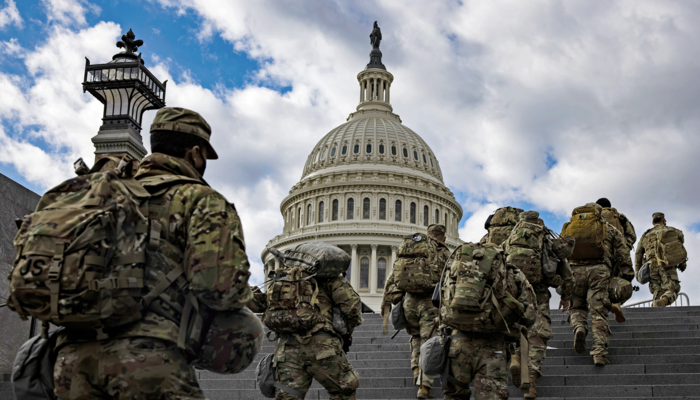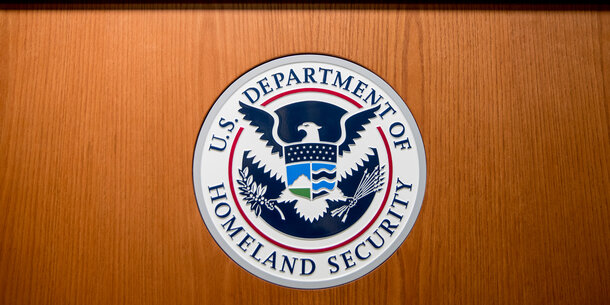The Posse Comitatus Act Explained
The law generally prevents the president from using the military as a domestic police force.

The Posse Comitatus Act bars federal troops from participating in civilian law enforcement except when expressly authorized by law. This 143-year-old law embodies an American tradition that sees military interference in civilian affairs as a threat to both democracy and personal liberty. However, recent events have revealed dangerous gaps in the law’s coverage that Congress must address.
What does the term “posse comitatus” mean?
In British and American law, a posse comitatus is a group of people who are mobilized by the sheriff to suppress lawlessness in the county. In any classic Western film, when a lawman gathers a “posse” to pursue the outlaws, they are forming a posse comitatus. The Posse Comitatus Act is so named because one of the things it prohibits is using soldiers rather than civilians as a posse comitatus.
What are the origins of the Posse Comitatus Act?
The Posse Comitatus Act was passed in 1878, after the end of Reconstruction and the return of white supremacists to political power in both southern states and Congress. Through the law, Congress sought to ensure that the federal military would not be used to intervene in the establishment of Jim Crow in the former Confederacy.
Despite the ignominious origins of the law itself, the broader principle that the military should not be allowed to interfere in the affairs of civilian government is a core American value. It finds expression in the Constitution’s division of power over the military between Congress and the president, and in the guarantees of the Third, Fourth, Fifth, and Sixth Amendments, which were in part reactions to abuses committed by the British army against American colonists.
Today, the Posse Comitatus Act operates as an extension of these constitutional safeguards. Moreover, there are statutory exceptions to the law that allow the president to use the military to suppress genuine rebellions and to enforce federal civil rights laws.
What does the Posse Comitatus Act say?
The Posse Comitatus Act consists of just one sentence: “Whoever, except in cases and under circumstances expressly authorized by the Constitution or Act of Congress, willfully uses any part of the Army or the Air Force as a posse comitatus or otherwise to execute the laws shall be fined under this title or imprisoned not more than two years, or both.”
In practice, this means that members of the military who are subject to the law may not participate in civilian law enforcement unless doing so is expressly authorized by a statute or the Constitution.
Are all members of the military covered by the Posse Comitatus Act?
No, only federal military personnel are covered. While the Posse Comitatus Act refers only to the Army and Air Force, a different statute extends the same rule to the Navy and Marine Corps. The Coast Guard, though part of the federal armed forces, has express statutory authority to perform law enforcement and is not bound by the Posse Comitatus Act.
Members of the National Guard are rarely covered by the Posse Comitatus Act because they usually report to their state or territory’s governor. That means they are free to participate in law enforcement if doing so is consistent with state law. However, when Guard personnel are called into federal service, or “federalized,” they become part of the federal armed forces, which means they are bound by the Posse Comitatus Act until they are returned to state control.
What are the main statutory exceptions to the Posse Comitatus Act?
There are many statutory exceptions to the Posse Comitatus Act, but the most important one is the Insurrection Act. Under this law, in response to a state government’s request, the president may deploy the military to suppress an insurrection in that state. In addition, the Insurrection Act allows the president — with or without the state government’s consent — to use the military to enforce federal law or suppress a rebellion against federal authority in a state, or to protect a group of people’s civil rights when the state government is unable or unwilling to do so.
What are the constitutional exceptions to the Posse Comitatus Act?
There are no constitutional exceptions to the Posse Comitatus Act. The law allows only for express exceptions, and no part of the Constitution expressly empowers the president to use the military to execute the law. This conclusion is consistent with the law’s legislative history, which suggests that its drafters chose to include the language about constitutional exceptions as part of a face-saving compromise, not because they believed any existed.
This has not stopped the Department of Defense from claiming that constitutional exceptions to the law exist. The Department has long claimed that the Constitution implicitly gives military commanders “emergency authority” to unilaterally use federal troops “to quell large-scale, unexpected civil disturbances” when doing so is “necessary” and prior authorization by the president is impossible. In the past, the department also claimed an inherent constitutional power to use the military to protect federal property and functions when local governments could not or would not do so. The validity of these claimed authorities has never been tested in court.
What are the weak points in the Posse Comitatus Act?
Events in 2020 and 2021 have highlighted two loopholes in the Posse Comitatus Act. The first involves the District of Columbia National Guard. Unlike all other state and territorial National Guards, the DC Guard is always under presidential control. Despite this, the Department of Justice has for years asserted that the DC Guard can operate in a non-federal, “militia” status, in which it is not covered by the Posse Comitatus Act. By this interpretation, presidents can use the DC Guard for law enforcement whenever they choose.
Another weakness in the Posse Comitatus Act arises from the law that allows the National Guard to operate in “Title 32 status.” In Title 32 status, a middle ground between purely state operations and federalization, Guard personnel are paid with federal funds and may perform missions requested by the president, but they remain under state command and control. That means they are not subject to the Posse Comitatus Act, even though they are serving federal interests.
How have these loopholes in the Posse Comitatus Act been exploited?
In the summer of 2020, President Trump deployed the DC National Guard into Washington to police mostly peaceful protests against law enforcement brutality and racism. Simultaneously, over the objections of DC’s mayor, the administration asked state governors to deploy their own Guard personnel into Washington in Title 32 status, and 11 governors did so. Although these out-of-state forces were nominally under their governors’ control, it was later revealed that they were reporting up through the DC Guard’s chain of command for “coordination” purposes. That meant they were ultimately taking orders from the president. In this way, the Trump administration brought a large, federally controlled military force into Washington and used it for civilian law enforcement, all while skipping over the procedures in the Insurrection Act and evading the political costs of invoking it. That is exactly what the Posse Comitatus Act is meant to prevent.
Moreover, the deployment of non-federalized, out-of-state Guard forces into a jurisdiction without its consent represents another threat to the Posse Comitatus Act. When operating in Title 32 status, Guard forces are exempt from the Posse Comitatus Act because they are under state command and control. A key part of that control is the governor’s right to decline a particular federal mission. That right is meaningless if the president can simply approach a different governor and ask her to deploy her state’s Guard into the unwilling governor’s state. In this scenario, the cooperating governor becomes a fig leaf for the president to use the military as a police force anywhere in the country, free from the constraints of the Posse Comitatus Act.
How should the Posse Comitatus Act be reformed?
Congress should pass three reforms to help close these loopholes in the Posse Comitatus Act. First, it should transfer control over the DC National Guard from the president to the mayor of Washington. The president would still be able to take command of the DC Guard when necessary by federalizing it, but it would then be subject to the Posse Comitatus Act, just like all other federally controlled military forces.
Second, Congress should clarify that governors may not send their National Guard forces into another state or territory without the latter jurisdiction’s consent. This will stop future presidents who want to use the military domestically, but do not want to follow the laws established by Congress, from going from governor to governor until they find one who is willing to do their dirty work.
Third, Congress should enact a law clarifying that the Posse Comitatus Act applies to National Guard forces whenever they report through a federal chain of command, regardless of whether they have officially been called into federal service. This will ensure that form is not elevated over substance and will more fully realize the principle behind the law.





